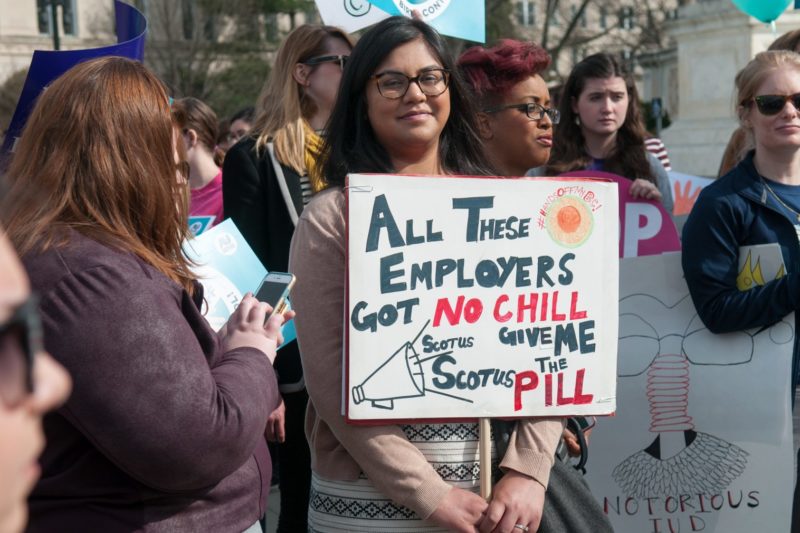The Fight Against Trump’s Birth Control Benefit Rollback Heats Up
A series of lawsuits filed to challenge the Trump administration's attack on the birth control benefit show that advocates do not intend to let this administration run over the rights of students and employees.

The Trump administration may not have had much luck getting the Republican-controlled Congress to pass a bill that would repeal the Affordable Care Act (ACA), but that hasn’t stopped it from attacking by every other means the parts of the ACA that offer the most protections for women and LGBTQ people.
Another attack came in the form of an interim final rule from the U.S. Department of Health and Human Services purporting to expand the exemption to Obamacare’s birth control benefit to most businesses that have either a religious or moral objection to complying with the law. The rule, an administrative procedure typically reserved for emergencies that require immediate federal agency action to address, took effect immediately.
So did a spate of legal challenges by reproductive rights advocates who argue the administration’s latest attack is not just an abuse of executive power—it’s an attack on the religious rights of students and employees who rely on the birth control benefit.
The lawsuits, filed by advocacy organizations such as the American Civil Liberties Union (ACLU) and the Center for Reproductive Rights, states like Massachusetts and Washington that have affirmative birth control nondiscrimination laws, and even individual women on their own behalf, illustrate just how prepared advocates and their clients are to take on this administration.
For the most part, the lawsuits all state similar facts and make similar legal claims. They present in great detail the public health benefits of contraception, such as preventing unwanted pregnancies, treating other serious medical conditions like ovarian cysts, and keeping women consistently in the workplace, which contributes to greater overall earnings. The lawsuits also offer great detail into what should be the government’s role in advancing those public health benefits by making access to contraception seamless and affordable. These are important details because they both set the framing of the legal fight to come and the factual record that the plaintiffs intend to develop in challenging the administration.
Perhaps most importantly, the lawsuits claim the rule on its face violates the First Amendment’s Establishment Clause by “having a predominant purpose” and “effect of advancing a particular set of religious beliefs”—in this case, evangelicals with an objection writ large to contraception and its use to prevent pregnancies. The lawsuits also claim the rule violates the Establishment Clause because “it is an official government endorsement of particular religious organizations and beliefs” and that it “fosters excessive government entanglement with religion.” According to the complaints, the rule is not neutral between religion and non-religion, as the Establishment Clause requires, because it “promotes and favors religious organizations and particular religious beliefs.”
“We are arguing that it is a violation of separation of church and state for the federal government to sanction discrimination against employees in the name of religion,” Brigitte Amiri, senior staff attorney at the ACLU’s Reproductive Freedom Project and attorney on one of the challenges, told Rewire in an interview. “What the government is doing is allowing employers to use their religious beliefs to block contraception coverage for their employees: coverage that is otherwise guaranteed under law solely because of their religious objection to contraception.”
“By doing so, the government has endorsed religion and furthered religion to the detriment of third parties,” Amiri continued, noting that this crosses the line “from accommodating into fostering religion.”
All these are the elements necessary to prove an Establishment Claim violation—and frankly, seeing them laid out in a legal complaint is a breath of fresh air. The Establishment Clause claim recognizes that students and employees have religious rights, including the right to be free from religion, that differ from their employers’.
During the first round of litigation challenging the birth control benefit, the Obama administration vigorously defended it—but also tip-toed around the fact that the challenges were grounded in a particular religious belief against contraception. Those lawsuits, like Burwell v. Hobby Lobby and The Little Sisters of the Poor v. Burwell were based on claims under the Religious Freedom Restoration Act and not direct constitutional challenges like those against Trump’s rule. Even so, the continuing push to roll back access to birth control is all part of the same conservative Christian quest to limit reproductive autonomy.
It’s too early in the litigation process to say if these most recent challenges will make their way to the Roberts Court. It’s safe to assume the Trump administration will defend the final rule aggressively as it did its various Muslim travel bans. And hopefully, the federal courts will remain a key firewall to the administration’s executive overreach. But if these cases do find their way to the U.S. Supreme Court, the claims are well positioned to defeat the Trump administration’s latest attack on reproductive rights and health care. The question, as always, is: Will the conservatives on the Supreme Court agree?

